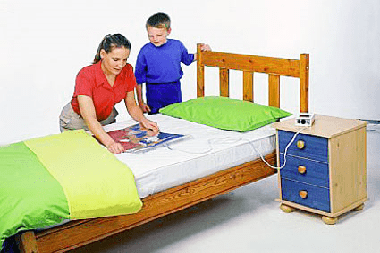Urology >>>> Nocturnal enuresis
Nocturnal enuresis.

Nocturnal enuresis is uncontrolled urination during sleep. It occurs in childhood (starting from the age of five), less often in adults, it can be combined with some diseases of the urinary system (urethritis,cystitis, pyelonephritis). Nocturnal enuresis is a fairly traumatic phenomenon for the child's psyche, which causes a lot of trouble for both himself and his parents. Not realizing that they are dealing with neurological or pathophysiological disorders, parents often reproach the child for inaccuracy.

The mechanism of occurrence of nocturnal enuresis is associated with the gradual formation of the functions of the nervous system as the baby grows up. Until about five years of age, urination is not a conscious process for a person and is controlled by the sacral spinal cord, or rather, by the spinal parasympathetic center that regulates the functions of the pelvic organs (in this case, the muscle - the detrusor of the bladder and the tone of the involuntary sphincter of the bladder).
When a child reaches the age of 5-6 years, uncontrolled urination, regulated by the spinal center, switches to the regulation of urination by centers in the brain, and at the same time connections are formed between the spinal and cerebral centers of urination control. During this period, the human body learns to control urination. It is for this reason that bedwetting is considered a symptom of functional disorders, starting from the age of five to six years.
The causes of nocturnal enuresis lie in dysfunctions of the body functions that control the process of urination, and are associated with:
- With impaired spinal and cerebral interactions during urination control,
- With violations of the secretion process of the hormone vasopressin (decrease in secretion), which controls the quantitative and qualitative indicators of urine and causes overflow of the bladder,
- With congenital or acquired diseases that provoke changes in the structure of tissues and the function of the urinary organs (urethra, bladder), infectious lesions of the urogenital organs (balanoposthitis (boys), vulvovaginitis (girls)),
- With a hereditary predisposition to nocturnal enuresis, when one of the parents or both parents suffered from enuresis during childhood,
- With psychological trauma developing against the background of a change of place of residence, divorce of parents, the appearance of a second child in the family, difficulties of adaptation in the children's team,
- With sound sleep, not allowing you to wake up in time when you urge to urinate.
Nighttime uncontrolled urination is diagnosed as a disease only if nocturnal enuresis has been observed for at least three months. At the same time, possible causes of nocturnal enuresis that are not associated with functional disorders (for example, consumption of large amounts of fluid at night, stress) are analyzed. A hardware study of the state of the organs of the genitourinary system is carried out to identify anomalies in the development of organs or diseases. Diagnostic examination is carried out jointly by a urologist, neurologist, psychologist, psychiatrist.
Treatment of nocturnal enuresis depends on the identified pathologies and is combined with the general recommendations developed for such cases.
- In particular, they develop an individual fluid intake schedule, monitor regular intake of sufficient fluid throughout the day, and stop drinking drinks two to three hours before bedtime.
- It is imperative that you go to the toilet immediately before going to bed.
- It is necessary to develop and observe a regimen of night trips to the toilet at regular intervals. To do this, one of the parents must get up in the middle of the night and wake the child up to urinate at night.
- If necessary, the hormonal drug desmopressin (nasal drops or intravenous) is prescribed - an analogue of the natural hormone vasopressin in case of its insufficiency.
- According to the indications, the drug Driptan is used, which reduces the tone of the smooth muscles of the bladder, or vice versa, if necessary, increase its tone with the drugs minirin, praserin.
- When neurosis-like states or neurosis are identified, drugs are prescribed to improve metabolic processes in the brain (nootropil, picamilon, novopassit and similar drugs) and create a comfortable emotional atmosphere for the child.
- Among physiotherapeutic methods, the most effective are gymnastics to strengthen the muscles of the pelvic floor and sound devices (urinary apparatus) to develop a conditioned reflex. The appearance of the first drops of urine causes the device to beep and wakes the child up to teach him to wake up when he starts urinating.
The process of treating nocturnal enuresis is a rather painstaking and lengthy business. Don't expect quick results. The child needs to create during the period of treatment the most comfortable psychological conditions, try to explain the need for procedures that may be unpleasant for him and create nervous tension. Never reproach him, not ridicule him, and, moreover, not punish him. It is not necessary for a child suffering from nocturnal enuresis to be sent to a camp and to other places of collective residence or recreation (hiking trips, sports camps, military sports schools, etc.).
Prevention of nocturnal enuresis is based on:
- refusal to use diapers (from about two years old and earlier),
- observance of careful hygiene of the child's genitals and gradual teaching this to himself,
- timely identify and treat infections and inflammations of the child's genitourinary system.

Read

Read



























